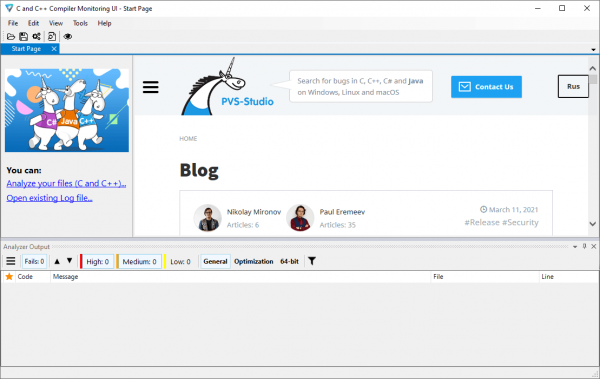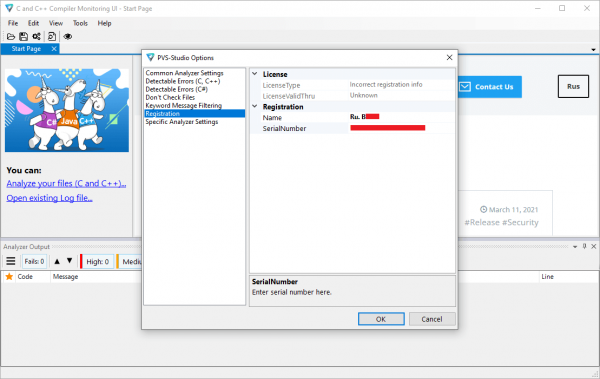Overview:

PVS-Studio 7.37.94973.1923 Crack is a tool for detecting bugs and security vulnerabilities in the source code of programs, which are written in C, C ++, C #, and Java. It works on 64-bit systems in Windows, Linux, and macOS environments and can analyze source code for 32-bit, 64-bit, and embedded ARM platforms.
PVS-Studio 7.37.94973.1923 License Key performs static code analysis and generates reports that help programmers find and fix bugs. PVS-Studio performs a variety of code checks and is also useful for finding typographical errors and copying and pasting. Examples of such errors are V501, V517, V522, V523, and V3001.
The main value of static analysis lies in its routine use so that errors are identified and corrected as soon as possible. There is no point in wasting 50 hours looking for bugs that can be found with a static scan. So, we’ll show you again – the main idea of static analysis is not to find a hidden bug the day before release but to fix dozens of bugs day after day.
The scanner can run overnight on the server and will automatically warn of suspicious code fragments. Ideally, these errors can be detected and corrected before they enter the version control system. PVS-Studio 7.37.94973.1923 Patch can be started automatically as soon as the file compiler has just changed. It works on Windows, Linux, and macOS.
PVS-Studio 7.37.94973.1923 Serial Key integrates with the Visual Studio 2010-2019 development environment. If you are using this IDE, just go to the PVS-Studio section of the menu and select “Check Current Projects”. However, this is often a more complicated process, requiring you to integrate PVS-Studio into even an exotic build system. The subject of such integration is too broad to be described here. You can find all the relevant information in our detailed documentation.
One more thing to note – PVS-Studio 7.37.94973.1923 Keygen for Windows and Linux provides special tools, which can collect build information during build. These tools allow a quick analysis of a project regardless of the construction system. You can quickly test the parser’s capabilities, without wasting time integrating it with make files or other build scripts.
PVS-Studio 7.37.94973.1923 Key Features:
- Simple and seamless integration with Visual Studio 2010-2019.
- Automatically scan individual files after recompiling them.
- Online reference guide for all diagnostic rules, available locally, on our website, and as a single .pdf file. Over 700 pages of documentation!
- Storage and load analysis results allow overnight checks – at night the analyzer performs the analysis and gives you the results in the morning.
- You can save scan results in HTML format with full source code navigation.
- Analysis can be performed from the command line: it helps to integrate PVS-Studio into the night build; new newspapers will be issued in the morning.
- High scalability: Supports multicore and multiprocessor systems with the ability to specify the number of cores to use; IncrediBuild support for distributed analysis.
- Interactive filtering of scan results (log files) in the PVS-Studio window: by diagnostic rule number, file name, keyword in diagnostic text, etc.
- Automatic checks for updates (in the IDE and when running builds overnight).
- Blame-notifier utility: This tool allows you to send email notifications to developers about bugs PVS-Studio found while running overnight.
- Analyze commit, merge, and drag requests – the analyzer can be configured to scan only changed files. This makes it possible to quickly and automatically analyze each commit in the version control system.
- A large number of integration options in projects developed under Linux and macOS.
- Mark as false alarm – Ability to mark code snippets to hide specific diagnostics on this row.
- Mass Suppression – Ability to hide all existing analyzer messages generated for old codes, so that the analyzer starts reporting 0 warnings. You can always come back to hidden messages later. This feature allows you to seamlessly integrate PVS-Studio into your development process and focus on errors found only in new code.
- Analyzer warning statistics can be viewed in Excel – provides a way to track error correction speed, the number of bugs found during a certain period, etc.
- Relative paths in the report file to display them on different machines.
- The compiler monitoring feature allows the analysis of projects that do not have Visual Studio files (.sln / .vcxproj) without the need to manually integrate with the build system; manual integration into any building system is possible if required.
- PVS-studio-analyzer – Linux compiler monitoring tool.
- Ability to exclude files from scanning by name, folder, or mask; to run a scan on files modified in the last N days.
- Integration with SonarQube – an open-source platform, designed for continuous analysis and measurement of code quality.
- Detection of security and safety weaknesses in the application lifecycle using Static Application Security Testing (SAST) methodology. PVS – Studio was included in the Forrester Research report “Now Tech: Static Application Security Testing, Q3 2020” as a SAST Specialist. This report is available by purchase or by subscription to Forrester Research.
What’s new in PVS-Studio 7.37?
(Released on 11-06-2025)
- Taint analysis in PVS-Studio C++ analyzer was expanded to support diagnostic rules for additional error types, including divisions by zero, buffer overflows, bitwise shifts, signed integer overflows, and passing tainted values as arguments. The update broadens the analyzer capability to detect potential vulnerabilities across a wider range of source code patterns.
- PVS-Studio C# and Java analyzers now take tainted data into account when detecting array overruns, overflows, and possible division by zero.
- PVS-Studio C and C++ analyzer’s handling of the standard library was improved, including better parsing of brace-initializer lists for built-in containers, along with annotations for std::min, std::max, std::unique_ptr<T[]>::reset, and std::unique_ptr<T[]>::release.
- Support for the C23 language standard in the PVS-Studio C and C++ analyzer has been extended to include the constexpr and alignas keywords.
- The option to select a version of the MISRA C Coding Guidelines standard is now available not only in the Visual Studio plugin but also in PVS-Studio plugins for Visual Studio Code, Qt Creator, CLion, Rider, and in the command-line utilities, PVS-Studio_Cmd.exe and pvs-studio-analyzer.
- The analyzer now supports C++ and C# MSBuild projects that use the SLNX solution format.
- It is now possible to enable or disable SAST identifiers for security-related diagnostic rules via .pvsconfig configuration files. To learn more about .pvsconfig files, refer to the documentation.
- [br:breakingchange] The V1077 diagnostic rule has been modified. Previously suppressed warnings for this diagnostic rule may require suppression again.
- [br:breakingchange] Due to the extension of the taint analysis mechanism to cover diagnostic rules V557, V609, V610, V1083, and V575, previously suppressed messages of the V1010 diagnostic rule may be reissued.
- Excessive file permissions can lead to vulnerabilities. Consider restricting file permissions.
- Potential resource leak. An inner IDisposable object might remain non-disposed if the constructor of the outer object throws an exception.
- Inconsistent use of a potentially shared variable with and without a lock can lead to a data race.
- Hardcoded IP addresses are not secure.
- Possible path traversal vulnerability. Potentially tainted data might be used to access files or folders outside a target directory.
- Possible cookie injection. Potentially tainted data is used to create a cookie.
- Native synchronization used on high-level concurrency class.
- Closeable object is not closed. This may lead to a resource leak.
- Using a Closable object after it was closed can lead to an exception.
- Possible deadlock due to incorrect synchronization order between locks.
- Integer overflow in arithmetic expression.
- Casting to a type with a smaller range will result in an overflow.
Screenshots:


How to install & activate it?
- Disconnect from the internet (Recommended).
- Extract and install PVS-Studio 7.37.94973.1923 by using setup.
- After the installation, don’t run the program or exit if launched.
- Copy the crack file to the installation directory and replace it.
- It’s done, enjoy PVS-Studio 7.37.94973.1923 Full Version.
PVS-Studio 7.37.94973.1923 Patch & Serial Key {Tested} Full Version Free Download from the links given below!
